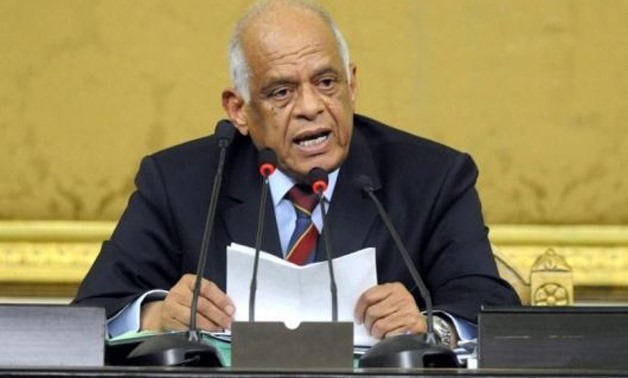
The Speaker of the House of Representatives, Ali Abdelaal- Wikimedia
CAIRO – 17 April 2018: Parliament finally approved on Tuesday the government-drafted law to regulate the legal procedures of seizing, managing and disposing of terrorist organizations' assets after the majority of MPs had voted for it.
On Monday April 16, the Parliament initially approved during its plenary sessionthe government-drafted law to regulate the legal procedures to seize, manage and dispose terrorist organizations' assets.
During the session, the Parliament discussed the report on the draft law made by the Legislative Affairs Committee and the National Defence Council, which initially approved the draft law on Sunday.
The initial name of the draft law was the draft law to regulate the legal procedures to seize, manage and dispose Muslim Brotherhood’s assets, but the Parliament decided during the plenary session to replace "Muslim Brotherhood" with "terrorist organizations".
The 18-article- draft law aims to regulate the legal procedures to sequester and dispose terrorist groups’ assets, including property, bonds, national or foreign cash as per the rulings of the Cairo Court for Urgent Matters.
According to the draft law’s Article 2, ad hoc committee with a status of a legal entity shall be established to take all the relevant necessary measures to execute the court's order, which includes any group, entity or individual in the terrorist list. The committee shall be located in Cairo at the Ministry of Justice until an independent headquarter will be established.
Article 3 stipulates that the committee shall be formed of seven judges from the Court of Appeal, serving in the committee for one year, to be renewed annually; the president shall issue a decree in this regard after the Supreme Judicial Council approves.
The draft law refers that all the state institutions, including private and public banks, shall cooperate with the committee to implement its resolution, and those who will not provide the committee with the necessary information will be punished with a year in prison and a fine not less than LE 10,000 and not more than LE 50,000.
According to Article 9, the committee shall appoint experts to manage and make an inventory check of the assets of terrorist groups; the committee shall determine the amount of money that meets the needs of the person with confiscated assets.
Article 5 stipulates that the committee shall declare its decree of confiscating assets to the owner within three days of the date of issuance as prescribed in Civil and Commercial Procedure Law.
The person shall appeal against the decree issued by the committee to execute the court order within 10 days from the day of its implementation, and the Court of Urgent Matters shall consider the appeal within 30 days from the date of the appeal, according to Article 6.
The Muslim Brotherhood was designated as a terrorist group in 2013 after committing several terrorist attacks to destabilize Egypt and incite interior chaos.
In September 2017, the Cairo Criminal Court decided to form a committee, led by Mohamed Yasser Aboul Fotouh, to appraise and seize the funds of the Muslim Brotherhood group, enlisted in the terrorist entities list.
The committee has frozen the assets of many Muslim Brotherhood members, including the assets of Cairo Portal Company for Publishing and Distribution, Alef bookstores, the children of Brotherhood leader Sheikh Youssef el-Qaradawi, 11 leading Brotherhood figures and businessman Hassan Malek.
The assets belonging to the detained Islamist politician Abdel Moneim Aboul Fotouh and 15 others were also confiscated on February 18.
The decision was based on the state’s national security investigations, which revealed that the defendants were using their money for terrorist activities.

Comments
Leave a Comment